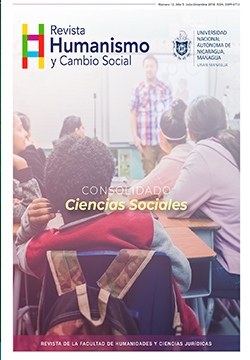Populism: A Comparison of Varguism and Peronism
DOI:
https://doi.org/10.5377/hcs.v0i12.8827Keywords:
Populism, Peronism, Varguism, Argentina, BrasilAbstract
This paper makes a comparative study between peronism and varguism, starting from the definition about both political movements as “populists”. In this context, this work will established relations among the way that the class aliance happened in both countries, as well searching differences among the dynamics that in each country prevailed. Populism, in both cases, appears as the result of vertiginous processes of economic modernization, characteristic of Latin American geopolitics. In this sense, analyzing populism necessarily implies thinking about the incorporation of the masses into public life, but also about industrial development and the conflicts inherent to that development, from which the working class will outline an active way to participate politically and economically.
Downloads
5709
References
• Di Tella, T. (1999) Historia de los partidos políticos en América Latina. Buenos Aires: FCE.
• García, M. A. (1997) La oposición política al peronismo. Los partidos políticos en la Argentina entre 1943 y 1951. Tesis doctoral dirigida por Juan Carlos Torre. Universidad Complutense de Madrid.
• Germani, G. (1962). Política y Sociedad en una época de transición. Bs. As.: Paidós.
• Halperin Donghi, T. (1993). El lugar del peronismo en la tradición política Argentina, en Amaral, Samuel y Mariano Plotkin (comps.). Perón, del exilio al poder. Buenos Aires, Cántaro.
• Hirst, M. La época de Vargas: 1930/1945. Escenarios Alternativos. Crítica & Utopía – N° 5.
• M. Mackinnon, Mario A. Petrone (compiladores). (1999), Populismo y neopopulismo en América Latina, el problema de la Cenicienta. Buenos Aires: Eudeba.
• Portantiero, Juan Carlos. (1977). “Economía y política en Argentina: 1958-1973”. EN: REVISTA MEXICANA DE SOCIOLOGÍA, vol. 39, Nº 2, abril-junio de 1977, pp. 531- 565.
• Sartori, G. (2010) La política, lógica y método en las ciencias sociales. México: FCE.
• Touraine, A. (1976). Las sociedades dependientes. México: Siglo XXI.
• Waldman, P. (1986). El peronismo, 1943-1955. Buenos Aires: Hyspamérica.
• Weber, M. (1967). El político y el científico. Madrid: Alianza.
• Weber, M. (2008). Escritos políticos. Madrid: Alianza.




